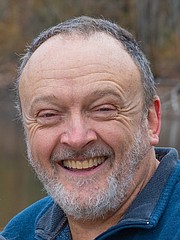Musician spotlight: Carol Davis brings some soul to North Idaho
Carol Davis was born and raised in San Francisco in what one might call a "mixed marriage" — her mother was a classical pianist, while her father played and sang gospel, jazz and blues.
Davis loved hearing all of it growing up, especially her mom’s classical piano playing and her father’s record collection, which introduced her at a young age to some of the great vocalists, such as Ella Fitzgerald, Billie Holiday, Etta James and others. Her father was a pastor, so she also grew up knowing great gospel singers including Danniebelle Hall, Walter Hawkins and Andraé Crouch.
Davis began singing and performing in church at the age of 5. Her aunt, Florence, was the choir director and was demanding and exacting, giving Davis a great foundation for her music. She loved singing and was eager to try out for solos from a young age.
By high school, she was singing in church on Sunday, and singing rhythm and blues and rock and roll with her brother, who played guitar and drums at high school dances. The church was not in love with the music at that time, but her dad approved and encouraged her singing. Rather than emulating one particular singer, Davis listened to the way each of her favorite singers took a song and made it uniquely their own. Davis drew what she liked from each singer to form her own unique style. Piano lessons were obligatory in her house, and she even studied accordion for a couple of years with a family friend who was an accordion teacher, but singing has always been her love and her passion.
Davis moved to Seattle after high school and auditioned for the music program at Seattle Pacific University. The audition was intimidating, as she was asked to sight-read a piece of sheet music for a song she had never seen before — something she had very little experience with. She passed the audition and began her first formal training in music theory. She also found a unique church, part of the Church of Christ, that does all of its music with no instruments. She joined a vocal group at the church and found that singing without any accompaniment was a great way to improve her ability to sing harmony.
Crouch did a concert at SPU, where Davis met a guitarist, who she followed to L.A. and married. She toured extensively as part of Crouch’s tour group, watching and learning from all kinds of performers. She took a break from touring and performing when her daughter was born and found herself wanting a career that would provide some stability and benefits, so she started working for the city of L.A. in parking enforcement. As her daughter grew and became more independent, she decided to apply to the officer academy and began a 25-year career as an L.A. police officer, eventually working as an officer trainer in the academy.
A cousin asked her why she had stopped performing, saying, “This is what you’ve always loved to do. It’s a part of you. Why have you set it aside?” Surprisingly her career in police work got her back into performing, starting with department parties. She would end up singing the national anthem for several Dodgers baseball games in uniform as a representative of the LAPD. She also joined City Beats, a band made up of people working in law enforcement. City Beats played department picnics and cookouts for police and fire departments. She was able to win a spot in the band through an audition when they decided to add a female vocalist. She was also working with various piano players singing jazz in clubs and coffeehouses.
The stereotype in North Idaho is that all LAPD officers are just counting the days until they can retire and move to Coeur d’Alene, but Davis had never heard of the town or the lake. She landed a regular gig at a jazz club in Palm Springs and, one weekend there, met a woman from Coeur d’Alene who invited her to visit. Davis knew she did not want to retire in California and quickly fell in love with both the town and the lake, eventually settling in Coeur d'Alene after retiring. She met some musicians hanging out at Studio 107 downtown. The owner one night heard her singing a couple of songs with Carey Brazil, a local guitarist and vocalist, and asked if they wanted to put together a duo, which they decided to do. This summer, Davis was singing regularly at Studio 107 with Brazil and as a solo artist. She also sang at the Taste of Coeur d’Alene and the Chalice Brewery. Through all of this, she met Sandra Marlowe, a local musician who was putting together a concert of women singing various styles (pop, jazz, country, blues and Broadway tunes) and asked Davis to take the part of the "Blues Diva" for the show titled "What She Said." This show was presented at the Jacklin Arts and Cultural Center earlier this summer.
Davis is now preparing for an encore presentation of "What She Said" — a Christmas Divas concert at the JACC on Dec. 10 and 11. The show will feature some of the music from the earlier show, as well as Christmas music in each of the different genres. Davis is looking forward to more work with "What She Said," as well as picking up her solo performances around Coeur d’Alene next summer. Tickets for the Christmas Divas show can be purchased on the JACC's website: thejacklincenter.org
• • •
Tom Richards is a music lover, the lead singer in local blues band Dr. Phil & the Enablers and the owner of The Snake Pit.



